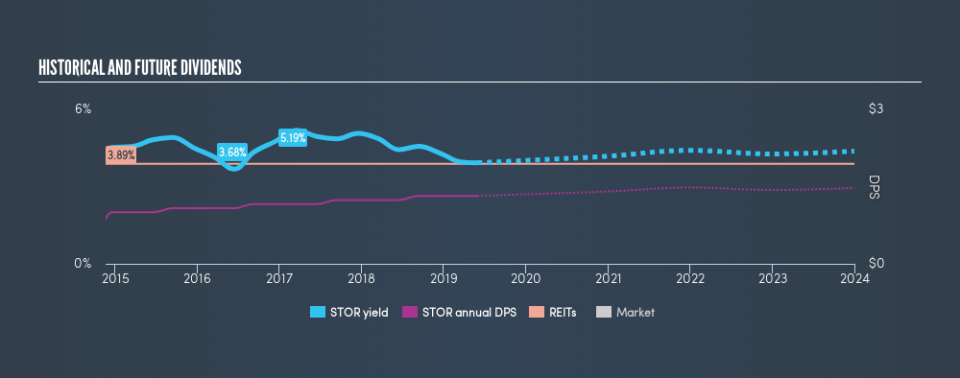Is STORE Capital Corporation (NYSE:STOR) A Smart Pick For Income Investors?

Want to participate in a short research study? Help shape the future of investing tools and you could win a $250 gift card!
Is STORE Capital Corporation (NYSE:STOR) a good dividend stock? How would you know? Dividend paying companies with growing earnings can be highly rewarding in the long term. If you are hoping to live on the income from dividends, it's important to be a lot more stringent with your investments than the average punter.
With a goodly-sized dividend yield despite a relatively short payment history, investors might be wondering if STORE Capital is a new dividend aristocrat in the making. We'd agree the yield does look enticing. Some simple research can reduce the risk of buying STORE Capital for its dividend - read on to learn more.
Explore this interactive chart for our latest analysis on STORE Capital!
Payout ratios
Dividends are typically paid from company earnings. If a company pays more in dividends than it earned, then the dividend might become unsustainable - hardly an ideal situation. So we need to be form a view on if a company's dividend is sustainable, relative to its net profit after tax. In the last year, STORE Capital paid out 71% of its profit as dividends. This is a healthy payout ratio, and while it does limit the amount of earnings that can be reinvested in the business, there is also some room to lift the payout ratio over time.
We also measure dividends paid against a company's levered free cash flow, to see if enough cash was generated to cover the dividend. The company paid out 64% of its free cash flow, which is not bad per se, but does start to limit the amount of cash STORE Capital has available to meet other needs. It's positive to see that STORE Capital's dividend is covered by both profits and cash flow, since this is generally a sign that the dividend is sustainable, and a lower payout ratio usually suggests a greater margin of safety before the dividend gets cut.
Is STORE Capital's Balance Sheet Risky?
As STORE Capital has a meaningful amount of debt, we need to check its balance sheet to see if the company might have debt risks. A rough way to check this is with these two simple ratios: a) net debt divided by EBITDA (earnings before interest, tax, depreciation and amortisation), and b) net interest cover. Net debt to EBITDA measures a company's total debt load relative to its earnings (lower = less debt), while net interest cover measures the company's ability to pay the interest on its debt (higher = greater ability to pay interest costs). With net debt of more than 5x EBITDA, STORE Capital could be described as a highly leveraged company. While some companies can handle this level of leverage, we'd be concerned about the dividend sustainability if there was any risk of an earnings downturn.
Net interest cover can be calculated by dividing earnings before interest and tax (EBIT) by the company's net interest expense. With EBIT of 2.37 times its interest expense, STORE Capital's interest cover is starting to look a bit thin. Low interest cover and high debt can create problems right when the investor least needs them. We're generally reluctant to rely on the dividend of companies with these traits.
Consider getting our latest analysis on STORE Capital's financial position here.
Dividend Volatility
One of the major risks of relying on dividend income, is the potential for a company to struggle financially and cut its dividend. Not only is your income cut, but the value of your investment declines as well - nasty. STORE Capital has been paying a dividend for the past five years. During the past five-year period, the first annual payment was US$0.87 in 2014, compared to US$1.32 last year. This works out to be a compound annual growth rate (CAGR) of approximately 8.6% a year over that time.
STORE Capital has been growing its dividend at a decent rate, and the payments have been stable despite the short payment history. This is a positive start.
Dividend Growth Potential
Examining whether the dividend is affordable and stable is important. However, it's also important to assess if earnings per share (EPS) are growing. Growing EPS can help maintain or increase the purchasing power of the dividend over the long run. It's good to see STORE Capital has been growing its earnings per share at 18% a year over the past 5 years. Earnings per share have been growing rapidly, but given that it is paying out more than half of its earnings as dividends, we wonder how STORE Capital will keep funding its growth projects in the future.
We'd also point out that STORE Capital issued a meaningful number of new shares in the past year. Regularly issuing new shares can be detrimental - it's hard to grow dividends per share when new shares are regularly being created.
Conclusion
Dividend investors should always want to know if a) a company's dividends are affordable, b) if there is a track record of consistent payments, and c) if the dividend is capable of growing. STORE Capital's is paying out more than half its income as dividends, but at least the dividend is covered by both reported earnings and cashflow. We were also glad to see it growing earnings, although its dividend history is not as long as we'd like. Ultimately, STORE Capital comes up short on our dividend analysis. It's not that we think it is a bad company - just that there are likely more appealing dividend prospects out there on this analysis.
Companies that are growing earnings tend to be the best dividend stocks over the long term. See what the 9 analysts we track are forecasting for STORE Capital for free with public analyst estimates for the company.
We have also put together a list of global stocks with a market capitalisation above $1bn and yielding more 3%.
We aim to bring you long-term focused research analysis driven by fundamental data. Note that our analysis may not factor in the latest price-sensitive company announcements or qualitative material.
If you spot an error that warrants correction, please contact the editor at editorial-team@simplywallst.com. This article by Simply Wall St is general in nature. It does not constitute a recommendation to buy or sell any stock, and does not take account of your objectives, or your financial situation. Simply Wall St has no position in the stocks mentioned. Thank you for reading.

 Yahoo Finance
Yahoo Finance 
